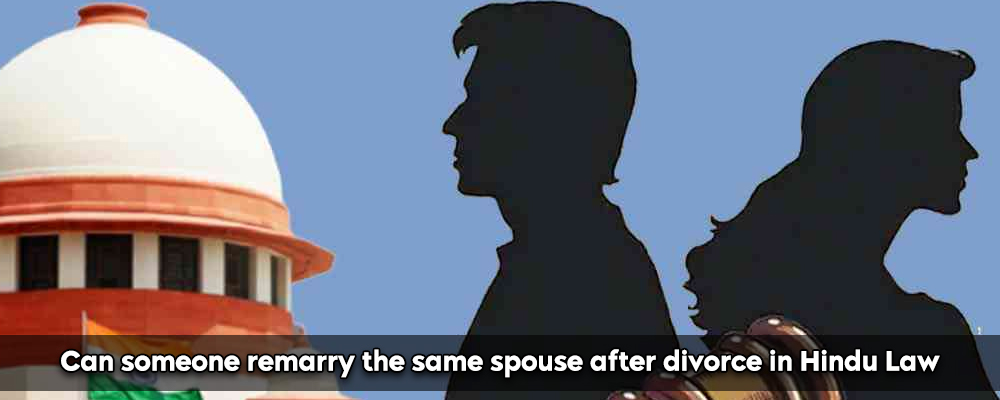All communities, whether proletariat, underdeveloped, or developed, have some kind of mating and some degree of societal regulation over sexual relationships, according to social anthropologists. Every culture regulates the sexual behaviour of its citizens. Everyone is allowed to get married once in their lifetime, however Hinduism forbids second marriages if a person wants to get married twice. Always seek legal counsel before divorcing.
The Hindu Marriage Act of 1955 (HMA) stipulated that neither party could be financially supported by a spouse at the time of the marriage. A woman was not allowed to marry a second time while her first husband was still living, unless tradition permitted it. There was no such barrier against males before certain States passed legislation to forbid bigamous unions and create the idea of monogamy among Hindus.
Need A Legal Advice
The internet is not a lawyer and neither are you. Talk to a real lawyer about your legal issue

According to the aforementioned paragraph and Section 11 of the Hindu Marriage Act, which went into force in 1955, second marriages in Hinduism were therefore regarded as void from the beginning, unless they fell within the exceptions (which will be examined in more depth).
Remarrying the same person
If you decide to remarry the same person after receiving a court-issued divorce judgement, the process may differ depending on whether you do so in accordance with Muslim personal law, the Hindu Marriage Act of 1955, the Special Marriage Act of 1954, or both.
- You can wed the same person quickly after being divorced if you use the Hindu Marriage Act of 1955 since the other party cannot challenge the divorce because you want to wed the same person again.
- When being married under the Special Marriage Act of 1954, you must submit the required paperwork to the Registrar of Marriage, along with witness affidavits from both parties. The Registrar will choose a time and publish a notice that is valid for 15 to 20 days. The marriage will be performed on the set date if no objections are voiced during this time.
Legal provision
In accordance with Section 15 of the Hindu Marriage Act of 1955, either spouse may legally remarry after a marriage has been dissolved by a divorce decree if there is no right of appeal against the decree, there is an appeal right but no time has passed without an appeal having been made, or an appeal has been made but was rejected. A provision in Section 15 that required the parties to a divorce to wait a year before getting married again was in effect prior to 1976. This clause was eliminated in 1976. Therefore, this waiting period is not relevant. The parties must hold off until the appeal time has passed or the appeal, if filed, has been rejected.
According to the legislation, if a marriage is dissolved and neither spouse has the option of appealing the divorce judgement, then any party may remarry. If an appeal is made, neither party may remarry until the appeal against the divorce judgement has been denied. A party cannot be married again while an appeal is being considered. The intent of Section 15 of the legislation is to ensure that an early remarriage will not render an appeal filed by a party in a divorce case against the judgement of dissolution of marriage illegal. The purpose of the clause is to prevent unneeded complexities brought on by a second marriage while the appeal is ongoing. In the event that the divorce judgement is overturned on appeal, it protects the interests of the person who is opposed to the divorce decision.
No Prohibition in a Divorce by Mutual Consent
The parties to a mutually agreed-upon divorce, however, would not be subject to the legislation’s Section 15 ban on a second marriage. Any divorced partner in such a marriage is able to wed again on any day following the divorce’s approval. This is so that the trial court’s divorce judgement, which is final since such a divorce decree is not legally subject to appeal.
Divorce was frowned upon, and wives were expected to make accommodations and reach agreements. However, the concept of divorce and therefore the necessary procedures to satisfy the expectations of a changing society were gradually formed with the passing of the Hindu Marriage Act of 1955. The right to a tranquil existence, as well as the freedom of speech and expression, among other vital fundamental rights, are thereby restricted when an abusive marriage is maintained.
If the divorce petition is filed in Ghaziabad then divorce lawyers in Ghaziabad can be searched. Divorce lawyers in Gurgaon may be appointed if the petition is filed in Gurgaon. Moreover, if the petition is filed in Mumbai then divorce lawyers in Mumbai may be hired. Likewise, divorce lawyers in Noida may be hired.
Lead India provides free legal advice, legal services, and online internet data. In this case, ask a legal question and talk to a lawyer is the best course of action.





 Talk to a Lawyer
Talk to a Lawyer